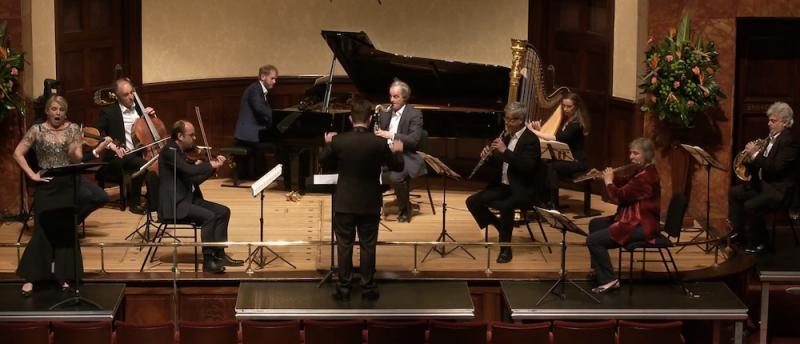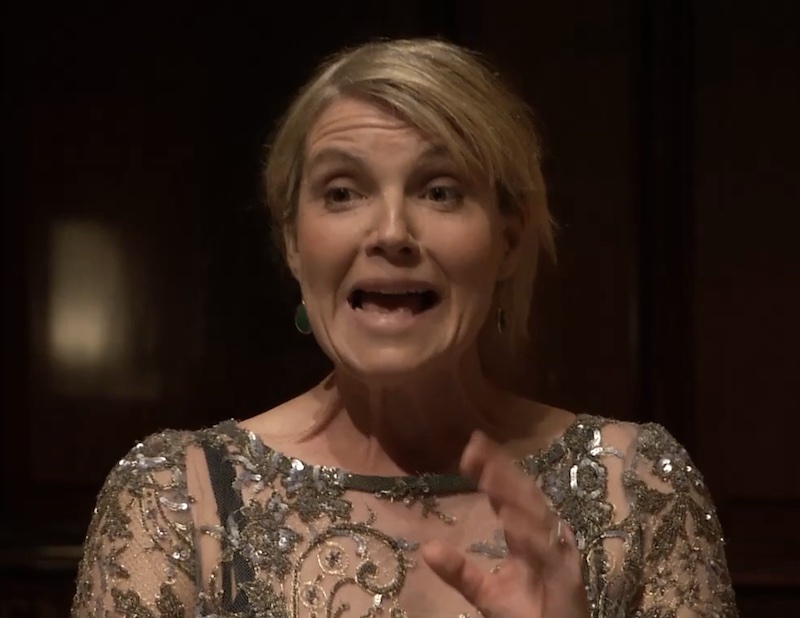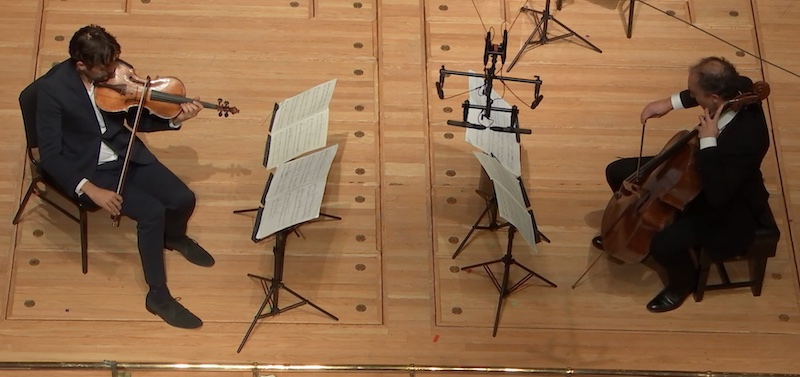Booth, Nash Ensemble, Wigmore Hall online review - contemporary music programme lacks diversity | reviews, news & interviews
Booth, Nash Ensemble, Wigmore Hall online review - contemporary music programme lacks diversity
Booth, Nash Ensemble, Wigmore Hall online review - contemporary music programme lacks diversity
Excellent playing and singing can’t disguise the absence of variety

Wigmore Hall does not dish up a great deal of contemporary music, preferring a menu of mainstream chamber music.
And is it ok, in 2021, to have a programme like this, comprising entirely white middle-aged/older men? (And, full disclosure, I write as a middle-aged white man.) I wanted to hear a youthful voice, a female voice, a voice from a different musical tradition than the modernist, post-tonal space all these composers inhabit. And not from a sense of worthiness or wokeness, but because it would have made a better, more varied programme.
Boyd Tonkin, in reviewing Sarah Connolly on Tuesday, praised her for a well-filled recital, where other online offerings have tended towards the short. I would respectfully disagree with my colleague and cite this concert as evidence: it was long – coming in at about 100 minutes – with several pieces outstaying their welcome and leaving me wanting a bit less. I find it harder to concentrate on an online concert than when listening “in the room” and I think this needs to be reflected in the programming, particularly when the music is complex and new. This may all sound a bit complainy and I should be clear that the Nash Ensemble’s playing was vivid and energised throughout, Claire Booth (pictured above) sang with character, passion and commitment in all her items, the stream was well filmed and presenter Andrew McGregor as personable and informative as always.
This may all sound a bit complainy and I should be clear that the Nash Ensemble’s playing was vivid and energised throughout, Claire Booth (pictured above) sang with character, passion and commitment in all her items, the stream was well filmed and presenter Andrew McGregor as personable and informative as always.
Each of the three world premieres emerged as successful in different ways. Simon Holt’s Cloud Shadow, depicting his Spanish home was a typically intuitive exploration of extremes of register, dynamic and tempo as the piece went from a skittering opening duet to a sombre kind of song for cor anglais (Gareth Hulse), contrabassoon (Ursula Leveaux) and bass clarinet (Richard Hosford). Colin Matthews’s Seascapes introduced me to a poet I didn’t know – Sidney Keyes, killed in action in Tunisia in 1943 at just 20 – and set his words in a Bergian, expressionist mode, with a richly lyrical soprano line that Claire Booth clearly relished.
Mark-Antony Turnage’s Owl Songs are a tribute to his friend and mentor Oliver Knussen, who died in 2018, and who Turnage nicknamed “Big Owl”. The settings were by turns assertive, sparkling and – in the end – doleful, the cor anglais again underpinning Booth’s poised singing. But Sir Harrison Birtwistle’s 20-minute Duet for 8 Strings, for all the tightness of the rhythmic connection between Lawrence Power’s viola and Adrian Brendel’s cello (pictured above), was a test of stamina for audience as much as players, and Julian Anderson’s solo string items Prayer and Another Prayer also felt overlong – not something I’ve ever felt about his music before.
But Sir Harrison Birtwistle’s 20-minute Duet for 8 Strings, for all the tightness of the rhythmic connection between Lawrence Power’s viola and Adrian Brendel’s cello (pictured above), was a test of stamina for audience as much as players, and Julian Anderson’s solo string items Prayer and Another Prayer also felt overlong – not something I’ve ever felt about his music before.
It would have been so much better to have spiced this collection of illustrious establishment names with someone surprising, someone who doesn’t normally have a platform like this, someone who could tweak the tail of these older men who, once upon a time, were tail-tweakers themselves.
rating
Explore topics
Share this article
Add comment
The future of Arts Journalism
You can stop theartsdesk.com closing!
We urgently need financing to survive. Our fundraising drive has thus far raised £49,000 but we need to reach £100,000 or we will be forced to close. Please contribute here: https://gofund.me/c3f6033d
And if you can forward this information to anyone who might assist, we’d be grateful.

Subscribe to theartsdesk.com
Thank you for continuing to read our work on theartsdesk.com. For unlimited access to every article in its entirety, including our archive of more than 15,000 pieces, we're asking for £5 per month or £40 per year. We feel it's a very good deal, and hope you do too.
To take a subscription now simply click here.
And if you're looking for that extra gift for a friend or family member, why not treat them to a theartsdesk.com gift subscription?
more Classical music
 Bizet in 150th anniversary year: rich and rare French offerings from Palazzetto Bru Zane
Specialists in French romantic music unveil a treasure trove both live and on disc
Bizet in 150th anniversary year: rich and rare French offerings from Palazzetto Bru Zane
Specialists in French romantic music unveil a treasure trove both live and on disc
 Scottish Chamber Orchestra, Ibragimova, Queen’s Hall, Edinburgh review - rarities, novelties and drumrolls
A pity the SCO didn't pick a better showcase for a shining guest artist
Scottish Chamber Orchestra, Ibragimova, Queen’s Hall, Edinburgh review - rarities, novelties and drumrolls
A pity the SCO didn't pick a better showcase for a shining guest artist
 Kilsby, Parkes, Sinfonia of London, Wilson, Barbican review - string things zing and sing in expert hands
British masterpieces for strings plus other-worldly tenor and horn - and a muscular rarity
Kilsby, Parkes, Sinfonia of London, Wilson, Barbican review - string things zing and sing in expert hands
British masterpieces for strings plus other-worldly tenor and horn - and a muscular rarity
 From Historical to Hip-Hop, Classically Black Music Festival, Kings Place review - a cluster of impressive stars for the future
From quasi-Mozartian elegance to the gritty humour of a kitchen inspection
From Historical to Hip-Hop, Classically Black Music Festival, Kings Place review - a cluster of impressive stars for the future
From quasi-Mozartian elegance to the gritty humour of a kitchen inspection
 Shibe, LSO, Adès, Barbican review - gaudy and glorious new music alongside serene Sibelius
Adès’s passion makes persuasive case for the music he loves, both new and old
Shibe, LSO, Adès, Barbican review - gaudy and glorious new music alongside serene Sibelius
Adès’s passion makes persuasive case for the music he loves, both new and old
 Anja Mittermüller, Richard Fu, Wigmore Hall review - a glorious hall debut
The Austrian mezzo shines - at the age of 22
Anja Mittermüller, Richard Fu, Wigmore Hall review - a glorious hall debut
The Austrian mezzo shines - at the age of 22
 First Person: clarinettist Oliver Pashley on the new horizons of The Hermes Experiment's latest album
Compositions by members of this unusual quartet feature for the first time
First Person: clarinettist Oliver Pashley on the new horizons of The Hermes Experiment's latest album
Compositions by members of this unusual quartet feature for the first time
 Gesualdo Passione, Les Arts Florissants, Amala Dior Company, Barbican review - inspired collaboration excavates the music's humanity
At times it was like watching an anarchic religious procession
Gesualdo Passione, Les Arts Florissants, Amala Dior Company, Barbican review - inspired collaboration excavates the music's humanity
At times it was like watching an anarchic religious procession
 Classical CDs: Camels, concrete and cabaret
An influential American composer's 90th birthday box, plus British piano concertos and a father-and-son duo
Classical CDs: Camels, concrete and cabaret
An influential American composer's 90th birthday box, plus British piano concertos and a father-and-son duo
 Cockerham, Manchester Camerata, Sheen, Martin Harris Centre, Manchester review - re-enacting the dawn of modernism
Two UK premieres added to three miniatures from a seminal event of January 1914
Cockerham, Manchester Camerata, Sheen, Martin Harris Centre, Manchester review - re-enacting the dawn of modernism
Two UK premieres added to three miniatures from a seminal event of January 1914
 Kempf, Brno Philharmonic, Davies, Bridgewater Hall, Manchester review - European tradition meets American jazz
Bouncing Czechs enjoy their Gershwin and Brubeck alongside Janáček and Dvořák
Kempf, Brno Philharmonic, Davies, Bridgewater Hall, Manchester review - European tradition meets American jazz
Bouncing Czechs enjoy their Gershwin and Brubeck alongside Janáček and Dvořák
 Solomon, OAE, Butt, QEH review - daft Biblical whitewashing with great choruses
Even a top soprano and mezzo can’t make this Handel paean wholly convincing
Solomon, OAE, Butt, QEH review - daft Biblical whitewashing with great choruses
Even a top soprano and mezzo can’t make this Handel paean wholly convincing

Comments
Fearlessly expressed, Bernard
Fearlessly expressed, Bernard. In a way, it's a last fling of a limited old guard. So many excellent works from them, yes, but quite a lot that has always been 'meh'. I remember the clique of male composers always at the same events in the late 1980s and early 1990s - I was reviewing for The Guardian then, and a pressure to write nice things was always unspoken. I hope I didn't succumb, and I never read the programme note before listening to the music, but nine times out of ten the works didn't 'speak' to anything other than admiration for technical proficiency.